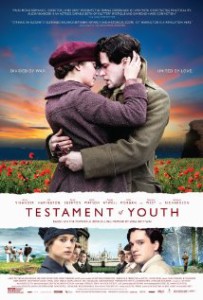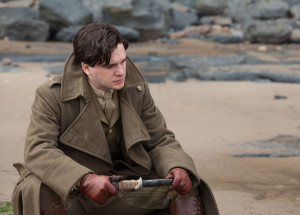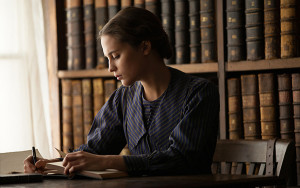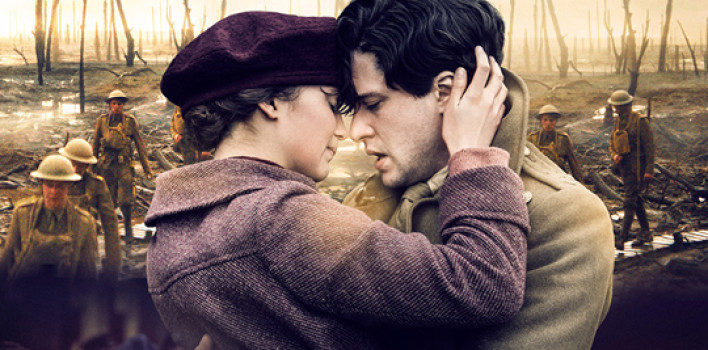Review| Testament of Youth
 “Our generation will never be new again… our youth has been stolen from us…” –Vera Brittain
“Our generation will never be new again… our youth has been stolen from us…” –Vera Brittain
WWII is probably the most cinematically featured time period simply because of the unspeakable atrocities done to an entire generation of people and culture. WWI is the prequel to WWII and what happened during that time set off the chain of events for the next two decades. Yet, for whatever reason, it’s quite rare to see WWI featured nearly as much on screen.
This is what makes Testament of Youth such a refreshing film. A true tale based on Vera Brittain’s published memoirs of the same title documenting her experiences as a youth in WWI. She was a fiercely independent, intellectual, stubborn, and ambitious woman. Her story enables us to experience The Great War through a young woman’s senses. She ferociously fought to be accepted into Oxford and won, in a time where an educated woman was deemed contemptible. At the start of the war she finds herself among the books and spires of her lifelong dream which she achieved entirely by tutoring herself.
Though Vera (Alicia Vikander) rebels from just about everything, including her own feelings and romantic sensibilities, love still finds her. In an early scene, she throws her books and writing pieces out the window in a fit of frustration with her father. Her brother’s guest, Roland (Kit Harington), offers to help pick up. As he does, he points out that she reads the romantics, like Shelley and Byron, though she puts on the front of being a staunch realist. In Roland she finds not only a man who respects her, but one who encourages her to pursue her passions.
This film is true to its time period in that it makes no apologies for our modern graces or political correctness. Often contemporary Western audiences have trouble wrapping their minds around other cultures or time periods where our modern receptivity does not exist. It is a credit to any filmmaker to be as genuine as possible lest we forget the truth. The script is authentically old-fashioned but at the same time maintains a sober viewpoint.
 Vera soon finds that Roland, her beloved brother Edward, and their friends have all been drawn into the war. She follows them too as a nurse insisting that she cannot stand by and do nothing.
Vera soon finds that Roland, her beloved brother Edward, and their friends have all been drawn into the war. She follows them too as a nurse insisting that she cannot stand by and do nothing.
True to the time, the characters have very little comprehension of the effects of war, particularly PTSD (a disorder not even publicly recognized until 1980). We see the devastating effects of PTSD through Roland, whose naturally passive, poetic nature gets overthrown by the horror of what he’s experienced in the trenches. Vera becomes helpless in understanding this change in him. Roland’s PTSD comes through in acting out opposite to his nature. Passivity becomes aggression, a romantic heart becomes cold and distant. He even shoves Vera when she tries to stop him from walking away from her. He ashamedly apologizes, but they are both filled with fear.
Vera: (placing her hand on his heart) Don’t lose this, this part of you.
Roland: It may be gone already
Not long after they mend their relationship and become engaged, Roland dies in combat. I really admire how director James Kent and screenwriter Juliette Towhidi make the audience feel as those in the time period would. There was no online media coverage, no e-mail, and limited phone usage. Acquiring closure and details on those who died in the war was next to impossible.
His things are sent back home to his family. Vera finds a bundle of a few poems with her name on it in the pocket of his coat. His poem “Villanelle” (which, like all poems in the film, is the actual words of the real Roland) is the deeply cutting emotional climax. Vikander’s performance in this scene is Oscar worthy and even saying that doesn’t do it enough justice. We never see Roland die except in a moment in Vera’s imagination and we never get to hear his last words to her except in that poem. It makes sense why she would talk to every officer she could and claw through his tattered uniform looking for something, anything to give herself one last moment with him. She ultimately gets the blessing of closure amidst the soul-crushing tragedy. Closure that he loved her and that the war did not take away that part of him in the end.
Vera loses Roland, her brother, and their friends to the war. Their deaths, and Roland’s PTSD, are what inspire her to speak out against war. She also learned to love her enemy while she served as a nurse. She spent a great deal of time with German soldiers and found sympathy as she witnessed many of them die in the medical tents, often with her their hands in hers.
The film achieves greatness in storytelling primarily through visuals. Vera’s emotions and sexual tension for Roland are shown in moments of her remembering in choppy flashbacks. It’s very sensual but tasteful, and accurately reflects the feelings of a young woman in love without being cheesy or cliché. The scenery is also used to draw in the viewer emotionally throughout the film. Places and nature have a great significance to the characters and their journey. There are moments when simply a long shot of the white road they would walk on together ushers tears.
Vera struggles through the darkness of grief for a long time. Though she returns to Oxford, a place that once delighted her, she is broken. She isolates herself and is left with nothing but dreams of those she’s lost. It’s not until a classmate reaches out to her that she begins to overcome her sorrow. An especially beautiful scene is when her friend comes to her room and tells Vera that spring is out there waiting for them. We then see Vera outside under a tree of white flowers. She studies them intently, and I feel like this is the moment she realizes she has something to live for, to carry on for. She discovers her calling to spread pacifism, a cause that she fought for until her last days.
 Testament of Youth is a story about the tragic effects of human sin and conflict on a global scale, and though it’s incredibly sad and candid, it is not without hope. Vera went on to marry another man very much like her and also a champion for the cause. They had two children and lived a full life. Testament of Youth was published in 1933 and became one of three memoirs in a critically acclaimed series. Vera Brittain lost so much during The Great War, but she was able to do exactly what she always set out to do; break the molds of tradition, educate herself, and write unforgettable pieces that shaped her culture.
Testament of Youth is a story about the tragic effects of human sin and conflict on a global scale, and though it’s incredibly sad and candid, it is not without hope. Vera went on to marry another man very much like her and also a champion for the cause. They had two children and lived a full life. Testament of Youth was published in 1933 and became one of three memoirs in a critically acclaimed series. Vera Brittain lost so much during The Great War, but she was able to do exactly what she always set out to do; break the molds of tradition, educate herself, and write unforgettable pieces that shaped her culture.
Though the events in this film occurred 100 years ago, Brittain’s Testament is completely relevant to our world today. Showing us the power of honest writing and the impact it can have on the hearts of a nation. As Roland told Vera, “You must write.”








